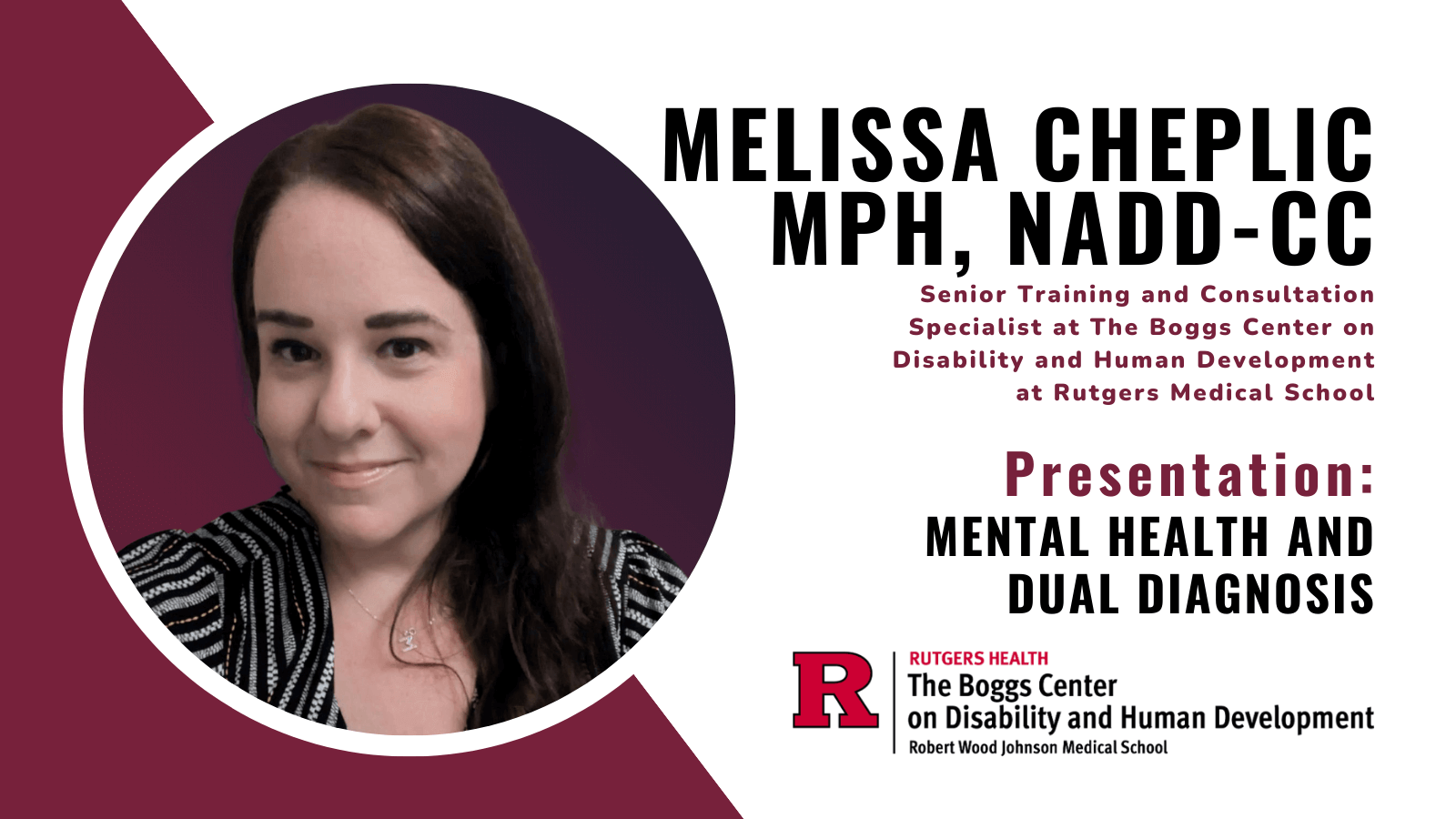-
Inclusive Mental Health Symposium Preview: Mental Health and Dual Diagnosis, Presented by Melissa Cheplic, MPH, NADD-CC
- Posted on March 25, 2025
- by admin
- in All Articles, Mental Health, NFSB Blog
- Comments Off on Inclusive Mental Health Symposium Preview: Mental Health and Dual Diagnosis, Presented by Melissa Cheplic, MPH, NADD-CC
Nutley Family Service Bureau (NFSB) will host our first “Inclusive Mental Health Symposium: Enhancing Provider Understanding of Mental Health for Persons with Disabilities,” a virtual event, on Thursday, April 24 from 9:30 am – 5:30 pm.” The event is funded by the New Jersey Division of Disability Services through the Inclusive Healthy Communities initiative. This article is part of a series of previews of symposium presentations.
Research suggests that 30-50 percent of people with IDD also have a co-occurring mental health condition. In fact, people with IDD are more likely to experience trauma, abuse, neglect, unemployment, underemployment, food insecurity, and challenges with transportation, relationships, language, and daily living. Despite the prevalence of mental health conditions, this community is not receiving much-needed care.
“Many people who experience disability, particularly IDD, have mental health needs that go unnoticed,” said Melissa Cheplic, MPH, NADD-CC, Senior Training and Consultation Specialist, The Boggs Center on Disability and Human Developmental, Rutgers Medical School. “Mental health symptoms are often overlooked, which leads to barriers and delays in the diagnosis of mental health conditions for people with IDD.”
For example, people who are unable to use language may not be able to self-report mental health symptoms with certain screening tools. There is also a tendency to assess behavior change without understanding the underlying causes, which can cause mental health symptoms to be mistaken for problem behaviors. Attribution of all symptoms to the known diagnosis – and missing other diagnoses – is called diagnostic overshadowing.
In her role at The Boggs Center, Melissa supports the organization’s mission to promote self-determination and full participation for people with disabilities in all aspects of community life. She offers training and technical assistance to community providers, state agencies, and health professionals while preparing students to support people with disabilities.
Melissa develops nationally recognized curricula and coauthored the training manual, “Mental Health Approaches to Intellectual/Developmental Disability”, a series of training modules used by clinicians and organizations across the country. In addition to her work with The Boggs Center, Melissa is pursuing her Doctor of Public Health at Rutgers University.

About the Presentation
Melissa will provide insights that enable participants to define terminology related to IDD, mental health, and dual diagnosis, determine why people with IDD are at risk for co-occurring mental health conditions, and recognize barriers to assessment and diagnosis of mental health conditions in people with IDD.
“The ‘dual’ in dual diagnosis refers to a diagnosis on two domains – the mental health domain and the disability domain,” Melissa said. “We have very fragmented service systems. As a result, an individual may be known and understood in the disability system but not in the mental health system, or vice versa. We often don’t know about that second need until we see behavior change, a crisis, or certain transitions in life.”
Health equity is achieved when services and programs available to people without disabilities are also available to people who experience disability. As more service providers gain an understanding and working knowledge of the mental health needs of people with disabilities, we can bridge this disparity and truly promote health equity.
As a resident of Nutley for 12 years, Melissa is especially grateful for this opportunity to partner with NFSB for the Inclusive Mental Health Symposium.
“The Boggs Center gives me an opportunity to teach and train on best practice, but also to infuse my knowledge of the system, having done the work myself,” Melissa said. “It’s important that service providers understand IDD, the barriers to diagnosis, and the health needs of people with IDD across the lifespan. I’ve seen how this knowledge can impact people’s lives, and I’m glad NFSB invited me to present to service providers who are as committed to the community as I am.”
To learn more about symposium presentations, download the symposium schedule, and purchase tickets, visit the Inclusive Mental Health Symposium page on the NFSB website.
If you enjoyed this article please consider sharing it!

















